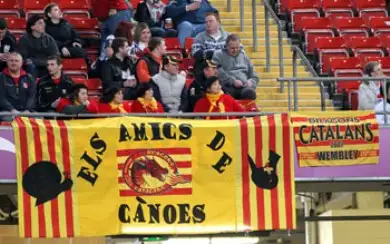French presence at risk

Now we know who is to step up to Super League next season, much of the attention will be given to the team to drop out, if as expected the league remains at 14.
Wakefield are heavy favourites in the eyes of many, after their financial problems and stadium difficulties, but new owner Andrew Glover isn’t going to go down fighting.
The progress shown by Salford and their new stadium seems to have secured their future licence, while Castleford’s superb performances on the pitch will soon make it impossible for the RFL to eject them from the competition.
With Crusaders and Harlequins seemingly safe for the infinite future, it’s the credentials of another expansion club, Catalan Dragons, that need to be analysed.
In essence, the Dragons’ inclusion in the top flight was the pre-cursor to the licensing system. They were elevated at the expense of Widnes, who will return next season, in time for 2006, and clocked up a Challenge Cup final and a third placed finish in their first three seasons.
But since then, they have struggled to make much of an impact, and with the current economic climate, the logistics of having an overseas based team are proving costly for clubs.
Their inclusion was meant to enhance the French national team, ultimately to give England a competitive mid-season fixture. It’s almost as if this has been given up on, with the Exiles taking France’s place this year after last year’s England walkover. Wales’ progress and triumph in the European Cup, having had a Super League team for just two seasons, has no doubt given the powers that be food for thought.
The French domestic league seems to be in great shape too. Lezignan, amongst others, boast strong line-ups and an increasing number of full-time players, as crowds continue to rise in the Elite Championship.
Is it time, therefore, for Catalan, and Toulouse, to make a return and help develop the French domestic league, with the hope of developing some sort of Anglo-French domestic competition in the future?
Toulouse pose their own set of problems. Their inclusion in the Championship makes little sense, particularly with the forthcoming re-structure. While it is a great trip for Championship fans, it comes at a cost for clubs and the RFL, as does Toulouse’s fortnightly trips to the UK for games. Their crowds are unspectacular, and with them missing out on Super League once again, it is maybe time to look at saving costs, and encouraging Toulouse to assist in the development of a thriving French game.
It leaves much to ponder. Although most would assume that Super League will stay at 14, the re-negotiation of the TV deal and a new title sponsor for the league may bring in more money, and justify an expansion to 15, enabling the retention of all existing clubs, plus Widnes.
But maybe it’s time for the RFL to look at improving the game’s status in this country by playing to its strengths – embracing the investment and passion of the heartlands, with feasible, gradual expansion in this country, while of course assisting the French domestic set-up in its own growth.
What will happen? Who knows.